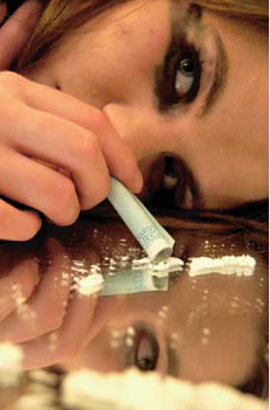Cocaine Information
- Causes of Cocaine Abuse
- Signs of Cocaine Abuse
- Student Cocaine Abuse
- Who invented Cocaine
- Cocaine Abuse and Overdose
- Cocaine Abuse Effects
- Cocaine Abuse Statistics
- Cocaine Abuse Treatment
- Cocaine Photos
- Dangers of Cocaine Abuse
- How is Cocaine Taken
- How much does Cocaine Cost
- Side Effects of Cocaine Abuse

Cocaine Abuse and Overdose
 Cocaine abuse and overdose (or simply overdose) describes the ingestion of cocaine in quantities greater than are recommended or generally practiced. Cocaine abuse and overdose are widely considered harmful and dangerous as it may result in death.
Cocaine abuse and overdose (or simply overdose) describes the ingestion of cocaine in quantities greater than are recommended or generally practiced. Cocaine abuse and overdose are widely considered harmful and dangerous as it may result in death.
Types of Cocaine Abuse and Overdose
The word "overdose" implies that there is a safe dosage. Therefore, the term is commonly only applied to drugs, not poison. Cocaine abuse and overdose are sometimes done intentionally to commit suicide or as self-harm. However, many drug overdoses are accidental and are usually the result of irresponsible behavior, the misreading of product labels, cocaine use after a period of abstinence, and/or unexpected purity of the cocaine consumed.
Cocaine abuse and overdose can also take place when the user ingests more than one type of drug at a time. In fact, mixing cocaine with other substances makes using cocaine more likely to be fatal. The most common cause of death from cocaine overdose is respiratory failure. Respiratory failure is more common when a depressant drug such as heroin has been taken in addition to using cocaine. This combination is known as a speedball. Cocaine is also particularly dangerous when mixed with alcohol. Combining the two drugs creates a substance known as cocaethylene, which strengthens the high of cocaine and increases the risk of sudden death in the user.
Symptoms of Cocaine Abuse and Overdose
One of the most dangerous aspects of cocaine use is the high risk of cocaine abuse and overdose. The most common symptoms of a cocaine abuse and overdose include rapid heartbeat and hyperventilation. These reactions are often accompanied by a feeling of impending death. Although most people survive, several thousand die due to complications from cocaine abuse and overdose. All forms of cocaine and crack use have been linked with heart failure in users. This also includes otherwise healthy users.
Symptoms of cocaine abuse and overdose may include some or all of the following:
- Brain hemorrhage
- Dangerous or fatal rise in body temperature
- Death
- Delirium
- Heart attack
- Kidney failure
- Repeated convulsions
- Seizures
- Stroke
- Tremors
Diagnosis of Cocaine Abuse and Overdose
Diagnosis of an overdosed patient is generally straightforward if the drug is known. However, it can be very difficult if the patient cannot (or refuses to) state what drug they have overdosed on. At times, certain symptoms and signs exhibited by the patient or blood tests can reveal the drug in question. Even without knowing the drug, most patients can be treated with general supportive measures.
First aid for Cocaine Abuse and Overdose
Someone who is suffering from cocaine abuse and overdose will display symptoms such as rapid heartbeat, muscle cramps, seizures, paranoia, psychosis, confusion, loss of control of movement, vomiting, lack of consciousness, and possibly cardiac arrest. It can also result in a fatal condition known as excited delirium.
First aid in these cases involves staying with the person and helping them to remain calm. Move them to a quiet area, and where possible, apply a wet cloth to their neck or forehead. If unconscious, place them in the recovery position and call an ambulance.
